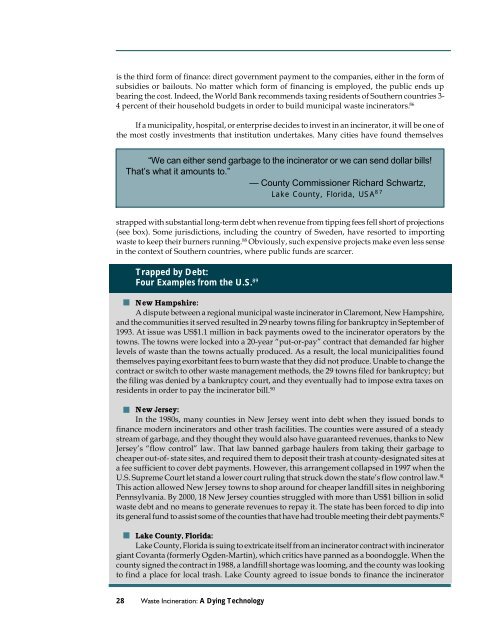Waste Incineration: A Dying Technology - GAIA
Waste Incineration: A Dying Technology - GAIA
Waste Incineration: A Dying Technology - GAIA
Create successful ePaper yourself
Turn your PDF publications into a flip-book with our unique Google optimized e-Paper software.
is the third form of finance: direct government payment to the companies, either in the form of<br />
subsidies or bailouts. No matter which form of financing is employed, the public ends up<br />
bearing the cost. Indeed, the World Bank recommends taxing residents of Southern countries 3-<br />
4 percent of their household budgets in order to build municipal waste incinerators. 86<br />
If a municipality, hospital, or enterprise decides to invest in an incinerator, it will be one of<br />
the most costly investments that institution undertakes. Many cities have found themselves<br />
“We can either send garbage to the incinerator or we can send dollar bills!<br />
That’s what it amounts to.”<br />
— County Commissioner Richard Schwartz,<br />
Lake County, Florida, USA 87<br />
strapped with substantial long-term debt when revenue from tipping fees fell short of projections<br />
(see box). Some jurisdictions, including the country of Sweden, have resorted to importing<br />
waste to keep their burners running. 88 Obviously, such expensive projects make even less sense<br />
in the context of Southern countries, where public funds are scarcer.<br />
Trapped by Debt:<br />
Four Examples from the U.S. 89<br />
New Hampshire:<br />
A dispute between a regional municipal waste incinerator in Claremont, New Hampshire,<br />
and the communities it served resulted in 29 nearby towns filing for bankruptcy in September of<br />
1993. At issue was US$1.1 million in back payments owed to the incinerator operators by the<br />
towns. The towns were locked into a 20-year “put-or-pay” contract that demanded far higher<br />
levels of waste than the towns actually produced. As a result, the local municipalities found<br />
themselves paying exorbitant fees to burn waste that they did not produce. Unable to change the<br />
contract or switch to other waste management methods, the 29 towns filed for bankruptcy; but<br />
the filing was denied by a bankruptcy court, and they eventually had to impose extra taxes on<br />
residents in order to pay the incinerator bill. 90<br />
New Jersey:<br />
In the 1980s, many counties in New Jersey went into debt when they issued bonds to<br />
finance modern incinerators and other trash facilities. The counties were assured of a steady<br />
stream of garbage, and they thought they would also have guaranteed revenues, thanks to New<br />
Jersey’s “flow control” law. That law banned garbage haulers from taking their garbage to<br />
cheaper out-of- state sites, and required them to deposit their trash at county-designated sites at<br />
a fee sufficient to cover debt payments. However, this arrangement collapsed in 1997 when the<br />
U.S. Supreme Court let stand a lower court ruling that struck down the state’s flow control law. 91<br />
This action allowed New Jersey towns to shop around for cheaper landfill sites in neighboring<br />
Pennsylvania. By 2000, 18 New Jersey counties struggled with more than US$1 billion in solid<br />
waste debt and no means to generate revenues to repay it. The state has been forced to dip into<br />
its general fund to assist some of the counties that have had trouble meeting their debt payments. 92<br />
Lake County, Florida:<br />
Lake County, Florida is suing to extricate itself from an incinerator contract with incinerator<br />
giant Covanta (formerly Ogden-Martin), which critics have panned as a boondoggle. When the<br />
county signed the contract in 1988, a landfill shortage was looming, and the county was looking<br />
to find a place for local trash. Lake County agreed to issue bonds to finance the incinerator<br />
28 <strong>Waste</strong> <strong>Incineration</strong>: A <strong>Dying</strong> <strong>Technology</strong>

















